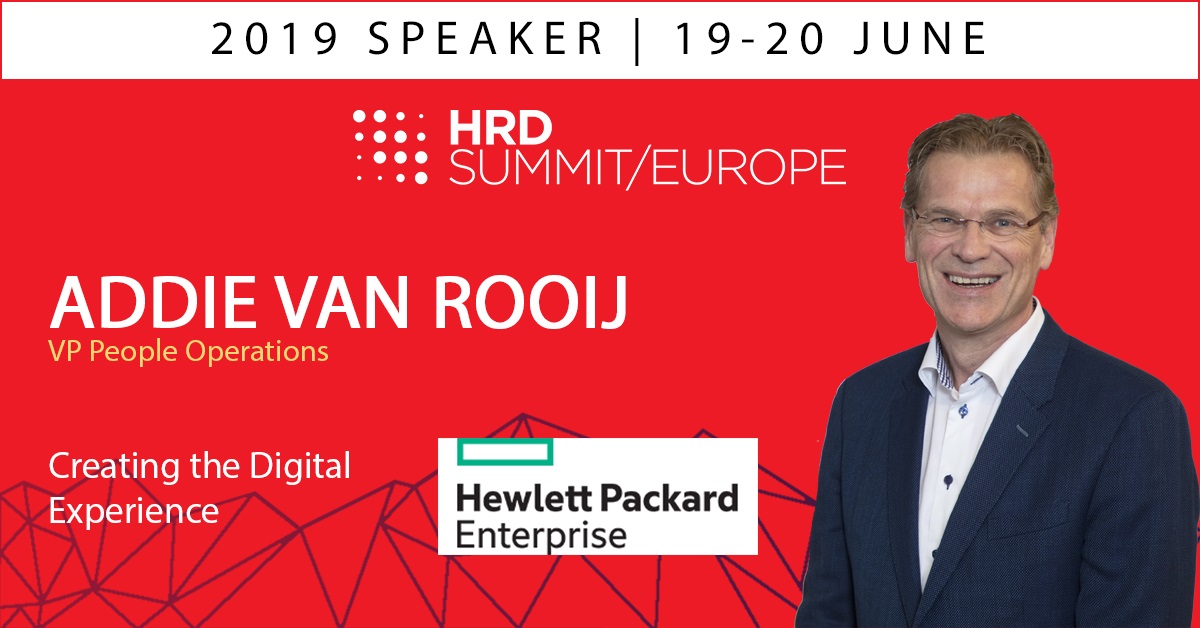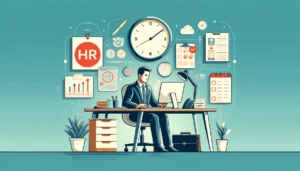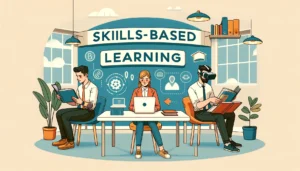Digital is putting the human back into HR: Addie van Rooij, HPE
- 6 Min Read
The digital experience is one that has fundamentally reorganised our daily lives. From the way we learn to the way we work, consume content or balance our wellbeing, digitization has had a profound effect on every aspect of our experience. In some aspects the world of work is catching up with the pace of the […]
- Author: Michael Hocking
- Date published: Apr 2, 2019
- Categories

The digital experience is one that has fundamentally reorganised our daily lives. From the way we learn to the way we work, consume content or balance our wellbeing, digitization has had a profound effect on every aspect of our experience.
In some aspects the world of work is catching up with the pace of the consumer experience, but in many other ways it continues to drag its knuckles.
Ahead of his appearance at the HRD Summit in Amsterdam June 19th-20th, Addie van Rooij, Vice President People Operations, L&D services, M&A HR services and Labour Relations, Hewlett Packard Enterprises, spoke to HRD Connect about the importance of the digital future in HR, and how the essential digital leader can, and must, be created.
Will the digital experience fundamentally change how people interact with one another within an organisation?
I think it will enable a different employee experience and change how organisations behave. Employees will have a different way of interacting with the company, with the HR function and with people managers, and so those roles will change according to employees’ needs, which will create opportunities to improve their experience. Rather than changing the nature of interactions between employees, the digital experience will change organizations and how employees interact with those organizations.
What do you see as the unexploited potential in technology within HR?
I believe that the HR function will have the opportunity to refocus on the personalisation of the employee experience, and therefore become more focused on individual employees rather than being more mass-oriented, as it has been for the last decade.
Back in the 1970s and 1980s, the question was always: “How many HR people do we need to support this number of employees?” This will become irrelevant in the future. Every individual will have a much better, more personal interaction with the HR function. The employee will feel that they are addressed in a very personal way, and their interactions with HR will be more closely tailored to their needs.
That is the unexploited potential in HR technology – to personalise the employee experience in this way, without the need that there was in the past to have a mass of HR people to perform that function.
How will this new digital HR experience manifest itself within organizations?
We’ll see it in multiple ways. The experience itself will involve me coming in to work in the morning and my laptop saying, “Good morning, Addie. This is what you have listed for today, your calendar, your tickets for travel – and by the way, I see that your daughter is turning eighteen and will need her own insurance. Here’s a form to send to your benefits provider.”
It will be really personal and recognize the individual. It will give you the sense and feeling that you are an individual whose immediate needs are met by an HR function that is addressing your personal interests directly. That’s going to feel good.
The old anxiety around technology in HR is that it will somehow take out the human element – but this digital experience sounds far more personal and adaptive, and in that way more beneficial to the individual human’s needs.
Exactly. We will bring the human into HR again. I can’t tell you exactly when, but it will happen.
What are the primary blockages facing the creation of digital effectiveness?
Firstly, there’s the readiness of the technology itself. It’s not yet as intuitive, customer-friendly and integrated as it should be. There will be a great deal of opportunity to improve that in the next couple of years.
Services like Netflix and mobile banking apps are singular systems. Currently, in the enterprise we have multiple systems running to provide different information, which are not integrated, and very often are passive instead of proactive. The technology needs to improve and become more intuitive before the experience can do the same.
Secondly, the ability to manage privacy for employees is currently a major inhibitor. There is often a lack of trust between employees and these systems. How do businesses use the data that comes out of these systems? There’s a need to make these systems more trustworthy for employees.
There’s also the issue of organizational adoption with a digital HR vision. Many of my colleagues have told me that they look into digital HR in the mindset of, “I need an AI” or “I need an analytics capability”, but they don’t necessarily look at it with the mindset of where they will be in three years’ time. I don’t see many HRs creating that vision for themselves and the path to it.
I would add that, generally, we do not yet possess the skills, or the culture required to really foster digital innovation in HR. What we require is the leaders to take us there, to help us focus on the skills and culture of our own digital vision.
How does an organisation create a digital leader?
That’s the million-dollar question. Leadership drives all of this, and often leaders aren’t risk takers, they’re more conservative, and this effects culture and the functions alongside them. Finance functions, for example, are the ripest for digitalization but are subject to a very conventional cultural attitude because of all the rules and regulations attached to them.
The digital leader of the future needs to be the one to take the risk – not risking their employees or their organization, but themselves. They need to have the courage to be the one who steps forward to take their organization in the right direction.
A digital leader does two things: they focus on the experience of the employee, and they bring their organization along with them in terms of skills, capabilities and engagement. Leaders need to evolve themselves and create a purpose for their organization.
You can catch Addie van Rooij at the HRD EU Summit, RAI Amsterdam, June 19th-20th. Tickets are available here.








